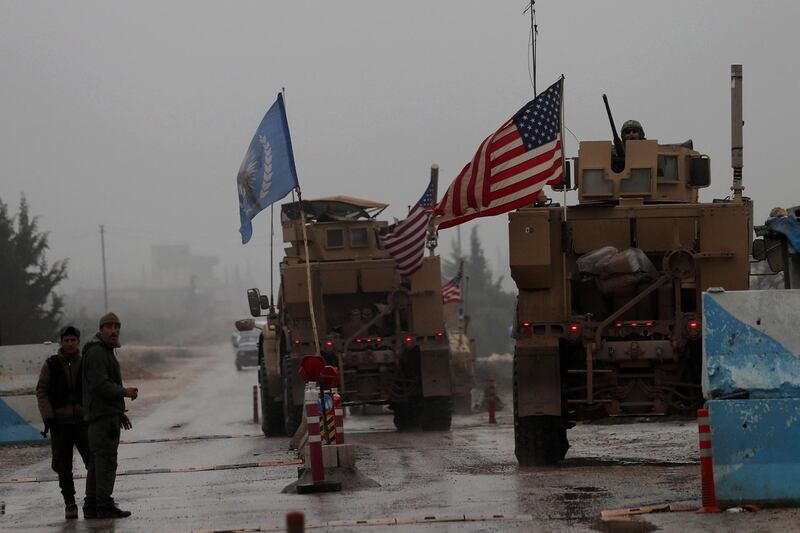President Donald Trump appears to be considering keeping US troops in Syria longer than he originally planned after talks with one of his biggest backers in the Senate and pressure from his security advisers and the State Department.
The Trump administration announced two weeks ago an imminent withdrawal of the roughly 2,000 US troops in Syria that was initially slated to start in 30 days, but Senator Lindsey Graham told reporters after a two-hour lunch meeting with the president on Sunday that the process was in a state of re-evaluation.
“I think we are in a pause situation where we are re-evaluating what is the best way to achieve the president’s objective of having people pay more and do more,” Mr Graham said.
“He [Trump] promised to destroy ISIS. He’s going to keep that promise. We’re not there yet, but as I said today, we’re inside the 10-yard line and the president understands the need to finish the job,” Mr Graham said.
He later tweeted that any US withdrawal would take place only after ensuring three conditions: the permanent defeat of ISIS; blocking Iran from filling the void; and ensuring that US-backed Kurdish forces were protected.
The President will make sure any withdrawal from Syria will be done in a fashion to ensure:
— Lindsey Graham (@LindseyGrahamSC) December 30, 2018
1) ISIS is permanently destroyed.
2) Iran doesn’t fill in the back end, and
3) our Kurdish allies are protected.
Mr Graham quoted Mr Trump as being “worried about Iranian influence” and the prospect of Tehran establishing a land bridge from Iraq into Lebanon through Syrian territory. While these concerns contradict Mr Trump’s past assertions that the only mission for US forces in Syria was defeating ISIS and that this had been accomplished, it is not uncommon for the president to change his mind.
In a tweet on Monday, Mr Trump appeared to backtrack on his assertion that ISIS had been defeated by saying US troops would continue fighting "ISIS remnants", and would be returning home "slowly".
Mr Trump's calculus appears to have also been changed by the promise of more financial input from America's Arab allies.
“Saudi Arabia has now agreed to spend the necessary money needed to help rebuild Syria, instead of the United States. See? Isn’t it nice when immensely wealthy countries help rebuild their neighbours rather than a Great Country, the US, that is 5,000 miles away. Thanks to Saudi A!" the president tweeted last week.
Mr Trump is also facing resistance to his withdrawal plan from his national security team and the State Department, an official familiar with the discussions told The National. The State Department's Syria team led by James Jeffrey and Joel Rayburn and the president's national security adviser John Bolton are advocating a slow pullout, and the Pentagon is preparing a list of options for the president. A Pentagon spokesperson declined to comment on "operational matters".
_______________
Read more:
[ US Secretary of Defence James Mattis resigns after clashing with Trump ]
[ Veteran diplomat Brett McGurk resigns as US envoy to anti-ISIS coalition ]
_______________
Mr Bolton is scheduled to visit Israel and Turkey next week to discuss the withdrawal plan.
Aaron Stein, the incoming Middle East director at the Foreign Policy Research Institute, told The National that Mr Bolton's trip was to discuss how to "keep the Assad regime and Iran out of areas vacated by US forces".
Mr Stein said he did not attach much significance to Mr Graham's announcement that Mr Trump’s was reassessing the US withdrawal. “I don’t see any major changes coming from the US side. It’s simply a debate about how to leave.”
But Nicholas Heras at the Centre for New American Security said Mr Graham’s statements “are important because they give us greater insight into just how tumultuous the process to withdraw US forces from Syria is".
The contradictions and uncertainty around Mr Trump's plan and the pace of withdrawal "makes it hard to take him or his Syria team's efforts seriously", Mr Heras told The National.
“We need to take a wait and see approach to figure out whether Mr Trump will actually do what Senator Graham says he is going to do in Syria.”
The US president, according to the Washington Post, has also consulted Senator Rand Paul, who favours a speedy withdrawal and has long opposed any US presence in Syria.
_______________
Read more:
[ Donald Trump's withdrawal of troops from Syria is a huge win for Damascus, Moscow and Tehran ]
Analysis: With Syria exit, Trump places Kurds in no man's land
[ James Mattis departure leaves Donald Trump short of vital experience ]
_______________






